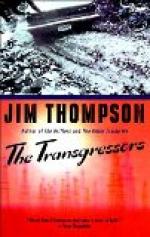CHAPTER XX.
IN THE ENEMY’S STRONGHOLD.
After an absence of weeks, during which time Harvey Trueman carries the war into the very heart of the Magnates’ strongholds, he returns to Chicago. His first mission is to visit Sister Martha. She had been kept in touch with his movements by short notes and aggravatingly brief telegrams, which he sent her as occasion permitted. In the papers she finds but meagre notice of the progress which the Independence party is making, for the censor of the press has effectually silenced all the important mediums. The News Associations, even, are brought under the ban and are given to understand that a violation of the orders of the Plutocratic Party will mean a forfeiture of all privileges of transportation to papers using the offensive news.
The meeting of these two ardent patriots is fraught with emotion. Trueman is the more moved by reason of the knowledge that he is regarded by Martha as the embodiment of all virtue, wisdom and power. He feels his incapacity to fill this exalted role, especially as the unrequited love he bears for Ethel Purdy is still burning in his heart.
“You do not seem yourself to-night,” Martha tells him frankly.
“No, that is true; I have so much to think about; so many details to keep in mind that I suffer from abstraction when I am not under the stress of actual labor.”
Trueman is seated beside a table in the centre of the Sisters’ Home, which has come to be the only haven of rest he knows in the whole world. He is in a communicative mood, and appreciating that the woman before him is an interested listener he is ready to review the events of the campaign.
“I have so many evidences of treachery in my own camp that at times I despair of the result of the struggle,” he says, half despondently.
“It is the accursed power of gold that is fighting you,” Martha breaks in vehemently. “O, if we could only have a few thousand dollars to fight them with their own weapon.”
At the mention of so paltry a sum to be pitted against the unlimited millions of the Magnates, Trueman cannot repress a smile.
“I know it may seem ludicrous for a woman to talk politics,” continues his gentle adviser, apologetically. “Yet it would not take as much as you imagine to nullify the effect of the millions of bribe money and tribute money that the Plutocrats are spending.
“What would you have me do with the money?”
“Use it in enlightening the people as to their true condition. It is impossible to conceive of men who would knowingly sell their birthright. The perfidy of the press is the sin of sins in this age of unbridled iniquity,” she declares, her face flushing with indignation. “Free speech has not yet been totally interdicted. Speak to the people; tell them to emancipate themselves.”
“You make me wish, almost, that your sex was not debarred from the exercise of suffrage,” Trueman declares. “If I receive as staunch support from the men of the land as I have already been accorded by the women I shall triumph at the polls.




